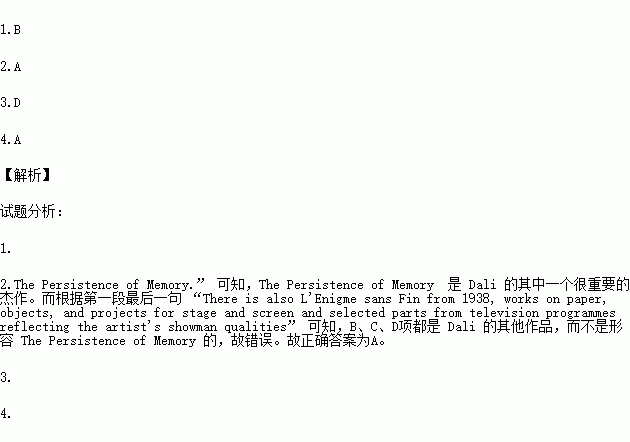题目内容
阅读理解。
Salvador Dali (1904-1989) was one of the most popular of modern artists. The Pompidou Centre in Paris is showing its respect and admiration for the artist and his powerful personality with an exhibition bringing together over 200 paintings, sculptures, drawings and more. Among the works and masterworks on exhibition the visitor will find the best pieces, most importantly The Persistence of Memory. There is also L’Enigme sans Fin from 1938, works on paper, objects, and projects for stage and screen and selected parts from television programmes reflecting the artist’s showman qualities.
The visitor will enter the World of Dali through an egg and is met with the beginning, the world of birth. The exhibition follows a path of time and subject with the visitor exiting through the brain.
The exhibition shows how Dali draws the viewer between two infinities (无限). “From the infinity small to the infinity large, contraction and expansion coming in and out of focus: amazing Flemish accuracy and the showy Baroque of old painting that he used in his museum-theatre in Figueras,” explains the Pompidou Centre.
The fine selection of the major works was done in close collaboration (合作)with the Museo Nacional Reina Sofia in Madrid, Spain, and with contributions from other institutions like the Salvador Dali Museum in St. Petersburg, Florida.
1. Which of the following best describe Dali according to Paragraph 1?
A. Optimistic. B. Productive.
C. Generous. D. Traditional.
2. What is Dali’s The Persistence of Memory considered to be?
A. One of his masterworks.
B. A successful screen adaptation.
C. An artistic creation for the stage.
D. One of the best TV programmes.
3. How are the exhibits arranged at the World of Dali?
A. By popularity. B. By importance.
C. By size and shape. D. By time and subject.
4. What does the word “contributions” in the last paragraph refer to?
A. Artworks. B. Projects.
C. Donations. D. Documents.

